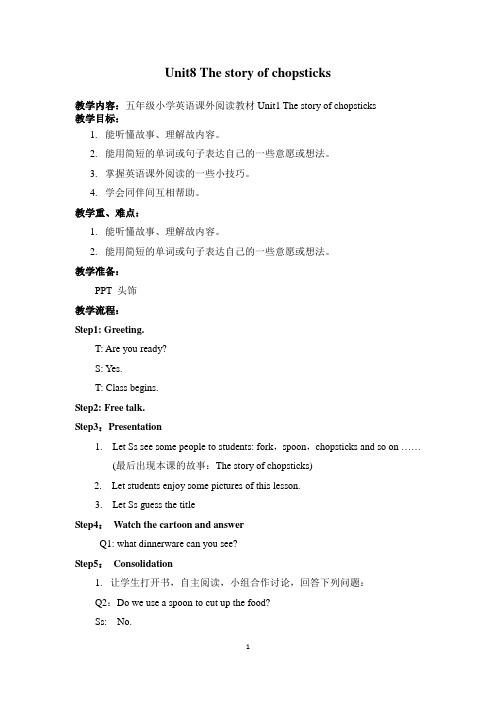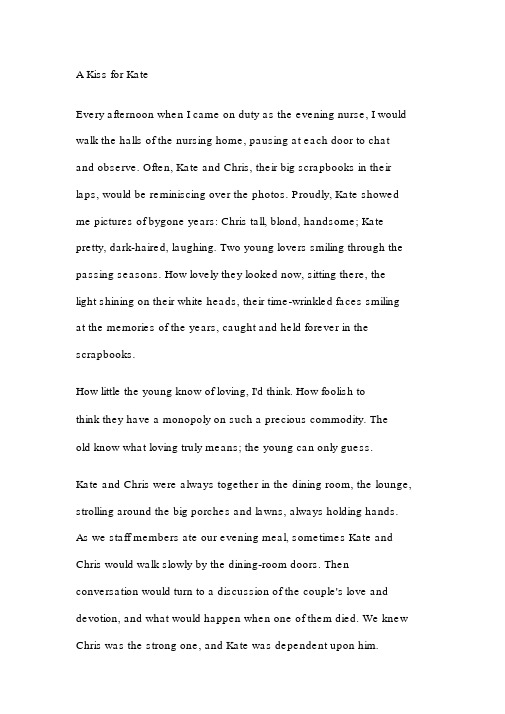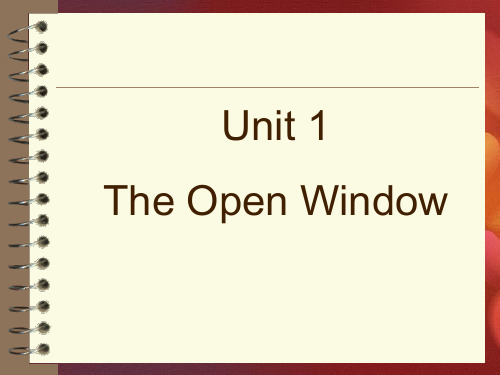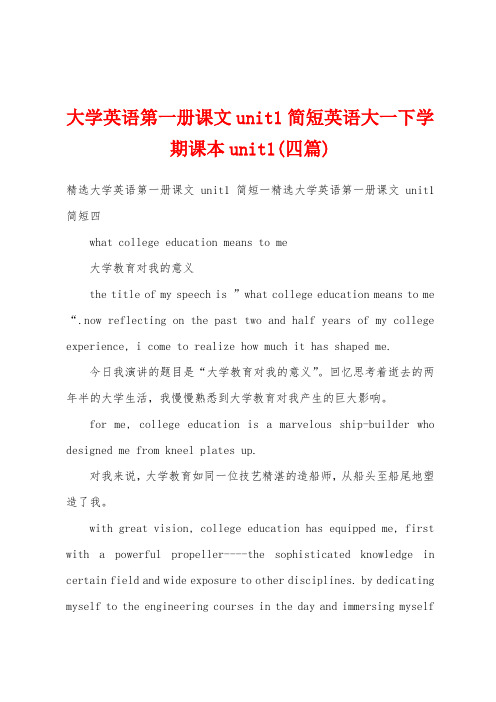Unit 1 英语短篇小说教程
《英语短篇小说教程》练习参考答案unit3、4

《英语短篇小说教程》练习参考答案Keys to Unit ThreeRichard Selzer: The Discus Thrower1) Questions for discussion(Suggested answers for reference)(1) What impression do you get of the patient from the description given in the story?(In spite of his serious illness, the man never moans or complains. He talks little and generally keeps the physical suffering to himself. He tries to maintain an image of a real man although he is in the grip of Death. He behaves in the manner of Hemingway’s “tough guy”–acting by the principal that “A man can be destroyed but can not be defeated.”)(2) In the short conversations, we hear the patient’s demand to know about exact time and his demand for shoes. Why is he still interested in time and what does he want shoes for since he can’t walk anymore?(His interest in exact time and his demand for shoes seem to suggest that, deep in his heart, the man refuses to accept the fate. It might be the result of fierce psychological conflict within the patient, with reality and rationality on one side, and wish and will on the other side. Some abnormal behaviors indicate the man’s unwillingness to reconcile with the fate in spite of his self-restrain.)(3) Read carefully the paragraph about plate-throwing. Why does the writer give such detailed description of it? What is your interpretation of this rather abnormal behavior?(From the detailed descriptions of his “discus” throwing, we seem to learn that the man is rather skillful at that, and that he might have had some training in the sport of throwing discus. Then why dose he throw plates? Is it because it brings back the memory of the best moment in his life when his physical power wins the glory and cheers? By this impulsive “reliving”or “restaging” of the explosive energy he once had, the man gains some satisfaction – he laughs after it – and proves that he is still alive. This action reveals the complicated inner world of a man who is forced to face death.)(4) Why does the writer choose “The Discus Thrower” as the title? Is it coincidence that the short story has the same title as the famous Greek sculpture Discobolus (Discus Thrower)?(In the Greek sculpture, we see the frozen moment of beauty: male vitality, energy and muscle power. It is a celebration of life and physical capability. This patient might once be a discus thrower, professional athlete or amateur, and now forms such a contrast to the sculptured image. This leaves a lot of room for reader’s own reflection on life and death.)2) Explanation and interpretation(Explain the implied meaning of the following sentences, and point out their significance in the context of the story.)(1) a. From the doorway of Room 542 the man in the bed seems deeply tanned. Blue eyes andclose-cropped white hair give him the appearance of vigor and good health.b. He lies solid and inert. In spite of everything, he remains impressive, as though he were asailor standing athwart a slanting deck.(The patient is fatally ill, but he looks, or keeps an image of a strong man. His life is threatened by disease, but the spirit of a strong man is still there. He does not collapse, but does what he can, though rather vainly, to struggle to maintain the dignity of a man.)(2) “Yes,” he says at last and without the least irony. “You can bring me a pair of shoes.”(see suggested answer to Question 2.)(3) It’s a blessing, she (the head nurse) says.(Though the head nurse is the one who has complained a lot about the patient’s unreasonable behaviors and upon his death she says “It’s a blessing,” it does not mean that she is cold blooded, and thus feels relieved of her troubles. She means that God has allowed him to go, so he no longer needs to suffer and to struggle in this world. It is thus a blessing from God.)(4) He is still there in his bed. His face is relaxed, grave, dignified.(He is dead, possibly dying with relaxed feeling as he has kept his final image of being a true man with dignity and can now sleep in peace.)《英语短篇小说教程》练习参考答案Keys to Unit FourSomerset Maugham: Mr. Know-All1) Opinions of Understanding:(1) Which of the following is a round character?A. The narrator “I”.B. Mr. Kelada.C. Mr. Ramsay.D. Mrs. Ramsay.(2) Which of the following is a most typical flat character?A. The narrator “I”.B. Mr. Kelada.C. Mr. Ramsay.D. Mrs. Ramsay.(3) The narrator decided that he might have an unpleasant company even before seeing Mr. Kelada because _______.A. he had to share a cabin with the latterB. he had known the latter to be a loud and noisy personC. the latter had a foreign nameD. the latter had a bad reputation(4) From the story we can deduce that Mrs. Ramsay’s pearl necklace was probably ________.A. a worthless imitationB. an expensive purchase that she borrowed money to pay forC. a gift from her husbandD. a gift from a lover of hers that her husband knew nothing about(5) By the end of the short story, the narrator said, “At that moment I did not entirely dislike Mr. Kelada.” The words may suggest that _______.A. he actually enjoyed the company of Mr. KeladaB. he found that Mr. Kelada was entirely different from what he had expected him to beC. he liked Mr. Kelada just for a momentD. he had changed his earlier attitude towards Mr. Kelada2) Questions for Discussion:(Suggested answers for reference)(1)What are the undesirable qualities of Mr. Kelada according to the narrator? Find them out inthe text and list them. Are they good proof that Mr. Kelada is an unpleasant person?1)…my fellow passenger’s name was (not) Smith or Brown. (not Anglo-Saxon sounding) (line 9).2) When I went on board I found Mr. Kelada’s luggage ..and toilet things (showing bad taste) (lines 11-16)3) Mr. Kelada was short and of a sturdy build, cleanshaven and dark skinned, with a fleshy, hooked nose and very large lustrous and liquid eyes. His long black hair was sleek and curly. (His physical features indicate that he is not a white European.) (lines 32-34)4) He spoke with a fluency in which there was nothing English and his gestures were exuberant. (lines 34-35)5) Mr. Kelada was chatty. (line 57)6) Mr. Kelada was familiar. …(observing) no such formality. (lines 64-68)7) “The three on the four,” said Mr. Kelada (participating in other person’s card game, being rather nosy) (lines 71-81)8) I not only shared a cabin with him and ate three meals a day at the same table, but I could not walk round the deck without his joining me. (caring little about other people’s privacy) (lines 85-86)9) He was a good mixer, and in three days knew everyone on board. He ran everything. (line 90-91)10) He was certainly the best hated man in the ship. We called him Mr. Know-All. (line 94)11) He was … argumentative. He knew everything better than anybody else. (lines 96-97)But the above list only proves that Mr. Kelada was a person of different culture and behaved differently. Nurtured by his more Oriental culture, he behaved in a way that was nothing wrong in itself, but was disliked by the narrator of the story, who held a prejudice against non-Western culture.(2) Underline the descriptions of Mr. and Mrs. Ramsay, and discuss the contrast between the couple.Mr. Ramsay:1) He was as dogmatic as Mr. Kelada and resented bitterly the Levantine’s cocksureness. (lines 103-104)2) He was a great heavy fellow from the Middle West, with loose fat under a tight skin, and he bulged out of his ready-made clothes. (lines 106-108)3) He was argumentative (lines 122-124) and insensitive (lines 155-170)Mrs. Ramsay:1) Mrs. Ramsay was a very pretty little thing, with pleasant manners and a sense of humor. (lines 110-111)2) She was dressed always very simply; but she knew how to wear her clothes. She achieved an effect of quiet distinction. (lines 111-113)3) You could not look at her without being struck by her modesty. It shone in her like a flower on a coat. (lines 115-116)(The husband and the wife are very different almost in every way. One is loud, fatty,aggressive and the other is quite, pretty and modest. The contrast gives the reader an impression that the man is unworthy of the lady and may indicate at possible lack of harmony in the marriage.)(3) We have been given enough hints about the true value of the necklace and the possible story behind it. Can you find them?1) “They’ll never be able to get a cultured pearl that an expert like me can’t tell with half an eye.” He pointed to a chain that Mrs. Ramsay wore. “You take my word for it, Mrs. Ramsay, that chain you’re wearing will never be worth a cent less than it is now.” (lines 134-137)2) Mrs. Ramsay in her modest way flushed a little and slipped the chain inside her dress. (line 136)3) “Oh, in the trade somewhere round fifteen thousand dollars. But if it was bought on Fifth Avenue, I shouldn’t be surprised to hear that anything up to thirty thousand was paid for it.” (lines 145-147)4) “Oh, Elmer, you can’t bet on a certainty,” said Mrs. Ramsay. (line 155)5) “But how can it be proved?” she continued. “It’s only my word against Mr. Kelada’s.”(line 159-160)6) Mrs. Ramsay hesitated a moment. She put her hands to the clasp. (line 164)7) “I can’t undo it,” she said. “Mr. Kelada will just have to take my word for it.” (line 165)8) The Levantine took a magnifying glass from his pocket and closely examined it. A smile of triumph spread over his smooth and swarthy face. (lines 170-172)9) … Mrs. Ramsay’s face. It was so white that she looked as though she were about to faint. She was staring at him with wide and terrified eyes. They held a desperate appeal. (lines 173-175)(4) Why did Mr. Kelada choose not to tell the truth of the value of the pearl necklace?(Obviously he wanted to help the helpless lady by not revealing the true value of the necklace. Otherwise she would have to face an awful and embarrassing explanation. He might have regarded Mr. Ramsay as being unworthy for the lady and acted out of disdain.)(5) Why did the narrator say by the end of the story “I did not entirely dislike Mr. Kelada”?(He seemed to be aware of his own prejudice after he had seen the positive quality of the Levantine: wisdom, self-sacrifice, and sensitiveness to other’s misfortunes.)3) Explanation and Interpretation:(Explain the implied meaning of the following sentences, and point out their significance in the context of the story.)(1) I was prepared to dislike Max Kelada even before I knew him.(This indicates that the narrator, the English gentleman, had a deep-rooted racial and cultural bias against non-English. It is not the person, but what his name represents that he disliked.)(2) But when I was told the name of my companion my heart sank…. I should have looked upon it with less dismay if my fellow passenger’s name had been Smith or Brown.(“Smith”and “Brown”are typical English surnames. The name “Max Kelada”indicates a man from a different, most likely “inferior” culture in the opinion of the narrator.)(3) The Consular Service is ill paid, and she was dressed always very simply.(This foreshadows the fact that the pearl necklace was far too expensive for her purse.)(4) Mrs. Ramsay in her modest way flushed a little and slipped the chain inside her dress.(She quickly hid the chain inside, an act that reveals her fear of its true value being noticed by somebody.)(5) “If I had a pretty little wife I shouldn’t let her spend a year in New York while I stayed at Kobe,” said he.(Mr. Kelada hinted that the husband’s leaving her alone in New York was unwise and had led to some consequences. She had now a wealthy suitor. )4) Suggested Homework:Let us suppose that in the afternoon on the same day when Mr. Kelada got back the 100 dollars, he met Mrs. Ramsay somewhere on the deck, and there were no other people around. They had a short conversation about what had happened previously. Using your imagination, write out the short dialogue between the two. The conversation may begin like this:(-- Good morning, Mrs. Ramsay. It’s a surprise to see you alone here.-- Good morning, Mr. Kelada. I don’t feel well, so I come out for a bit of fresh air.-- It’s always a pleasure to see a charming lady like you.-- Thank you for saying so. I’m extremely sorry for what happened yesterday, and I’m grateful for what you did, for me.)-- Lying about the necklace?-- Lying for my sake. You are generous and have a good heart.-- Anyway, I got the 100 dollars back. You delivered it yourself?-- Yes, I did. You did me a great service, and there is no way that you should be paying that money.-- I have been the laughingstock of everybody on board.-- You have my respect. I was real terrified yesterday, and fortunately you came to the rescue.-- It is a wonderful gift, that necklace, from a true admirer, I guess?-- You embarrass me, Mr. Kelada, but you seem to notice everything.-- It’s a good match to a pretty lady like you.-- Don’t laugh at me, I beg. I don’t think I’ll be wearing it anymore. Thank you again, and I think I’ll be going back to the cabin.。
五年级小学英语课外阅读教材Unit1 The story of chopsticks精品教学设计教案

Unit8 The story of chopsticks教学内容:五年级小学英语课外阅读教材Unit1 The story of chopsticks教学目标:1.能听懂故事、理解故内容。
2.能用简短的单词或句子表达自己的一些意愿或想法。
3.掌握英语课外阅读的一些小技巧。
4.学会同伴间互相帮助。
教学重、难点:1.能听懂故事、理解故内容。
2.能用简短的单词或句子表达自己的一些意愿或想法。
教学准备:PPT 头饰教学流程:Step1: Greeting.T: Are you ready?S: Yes.T: Class begins.Step2: Free talk.Step3:Presentation1.Let Ss see some people to students: fork,spoon,chopsticks and so on ……(最后出现本课的故事:The story of chopsticks)2. Let students enjoy some pictures of this lesson.3. Let Ss guess the titleStep4:Watch the cartoon and answerQ1: what dinnerware can you see?Step5:Consolidation1.让学生打开书,自主阅读,小组合作讨论,回答下列问题:Q2:Do we use a spoon to cut up the food?Ss: No.(让学生画出关键的句子)Q3: Was it hard to work together in pairs all the time?Ss: Yes.Step6:T总结:Reading tips阅读中,遇到生词,我们可以: 1. 查生词表。
2. 读课文图片,猜词义。
3. 询问老师。
……Step7: Summary:Q4: What do you know from the story? 你从故事中学到了什么?Step8:. Act the story.Choose one part to act.(选取一段扮演)Act the whole story. (整个故事扮演)Homework.1. Read and act the story after class2. Try to read the story 《The story of chopsticks》。
Unit1 Text1大学英语阅读教程

ability to understand an article or a passage
Main/central idea the key to understand the whole text, being presented in a complete sentence which covers the whole content of the paragraph
Translation: 骑着摩托沿着瑞普敦呼啸而过,风驰电掣 般超过在街道上散步的师长们,绕着那些在周日漫步街 头的危险而又目空一切的酗酒者们打转,没有任何人知 道你是谁,这种感觉真是惬意极了.
supercilious: unfriendly towards other people and scornful of them 目空一切的,高傲的
Translation: 我们靠肉糜压缩饼和滨豆度日,从岛的北端到 南端来回往返的长途跋涉使我们饱受缺粮的折磨。
• (L77) I can r em e mbe r v e ry cle a r ly ho w we experimented with eating boiled lichen and reindeer moss to supplement our diet.
• Main idea: the author’s life when saying goodbye to school and going to work
• 3 parts: L1-L39 the author’s farewell to his school
and process of finding the job he wanted L40-L80 his exploration with other senior
新编大学英语第一册unit1TextBAKissforKate

A Kiss for KateEvery afternoon when I came on duty as the evening nurse, I would walk the halls of the nursing home, pausing at each door to chat and observe. Often, Kate and Chris, their big scrapbooks in their laps, would be reminiscing over the photos. Proudly, Kate showed me pictures of bygone years: Chris tall, blond, handsome; Kate pretty, dark-haired, laughing. Two young lovers smiling through the passing seasons. How lovely they looked now, sitting there, the light shining on their white heads, their time-wrinkled faces smiling at the memories of the years, caught and held forever in the scrapbooks.How little the young know of loving, I'd think. How foolish tothink they have a monopoly on such a precious commodity. Theold know what loving truly means; the young can only guess.Kate and Chris were always together in the dining room, the lounge, strolling around the big porches and lawns, always holding hands. As we staff members ate our evening meal, sometimes Kate and Chris would walk slowly by the dining-room doors. Then conversation would turn to a discussion of the couple's love and devotion, and what would happen when one of them died. We knew Chris was the strong one, and Kate was dependent upon him.How would Kate function if Chris were to die first? Weoften wondered.Bedtime followed a ritual. When I brought the evening medication, Kate would be sitting in her chair, in nightgown and slippers, awaiting my arrival. Under the watchful eyes of Chris and myself, Kate would take her pill, then carefully Chris would help her from the chair to the bed and tuck the covers in around her frail body. Observing this act of love, I would think for the thousandth time, good heavens, why don't nursing homes have double beds for married couples? All their lives they have slept together, but in a nursing home, they're expected to sleep in single beds. Overnight they're deprived of a comfort of a lifetime.How very foolish such policies are, I would think as I watched Chris reach up and turn off the light above Kate's bed. Then tenderly he would bend, and they would kiss gently. Chris would pat her cheek, and both would smile. He would pull up the side rail on her bed, and only then would he turn and accept his own medication. As I walked into the hall, I could hear Chris say, "Good night, Kate," and her returning voice, "Good-night, Chris," whilethe space of an entire room separated their two beds.I had been off duty two days and when I returned, the first newsI heard was, "Chris died yesterday morning.""How?""A heart attack. It happened quickly.""How's Kate?""Bad."I went into Kate's room. She sat in her chair, motionless, hands in her lap, staring. Taking her hands in mine, I said, "Kate, it's Phyllis." Her eyes never shifted; she only stared. I placed my hand underher chin and slowly turned her head so she had to look at me. "Kate, I just found out about Chris. I'm so sorry.At the word "Chris", her eyes came back to life. She looked at me, puzzled, as though wondering how I had suddenly appeared. "Kate, it's me, Phyllis. I'm so sorry about Chris."Recognition and sadness flooded her face. Tears welled upand slid down her cheeks. "Chris is gone," she whispered."I know," I said. "I know."We pampered Kate for a while, letting her eat in her room, surrounding her with special attention. Then gradually the staff worked her back into the old schedule. Often, as I went past her room, I would observe Kate sitting in her chair, scrapbooks onher lap, gazing sadly at pictures of Chris.Bedtime was the worst part of the day for Kate. Although she was allowed to move from her bed to Chris's bed, and although the staff chatted and laughed with her as they tucked her in for the night, still Kate remained silent and sadly withdrawn. Passing her room an hour after she had been tucked in, I'd find her wide awake, staring at the ceiling.The weeks passed, and bedtime wasn't any better. She seemed so restless, so insecure. Why? I wondered. Why this time of day more than the other hours?Then one night as I walked into her room, only to find the same wide-awake Kate, I said impulsively, "Kate, could it be you miss your good-night kiss?" Bending down, I kissed her wrinkled cheek. It was as though I had opened the floodgates. Tears ran down her face; her hands gripped mine. "Chris always kissed me good-night," she cried."I know," I whispered."I miss him so, all those years he kissed me good-night." She paused while I wiped the tears. " I just can't seem to go to sleep without his kiss."She looked up at me, her eyes full of tears. "Oh, thank you for giving me a kiss."A small smile turned up the corners of her mouth. "You know,"she said confidentially, "Chris used to sing me a song."He did?""Yes," her white head nodded "and I lie here at night and think about it.""How did it go?"Kate smiled, held my hand and cleared her throat. Then her voice, small with age but still melodious, lifted softly in song: So kiss me, my sweet, and so let us part. And when I grow too old to dream, That kiss will live in my heart.。
全新版(第二版)第一册Unit1 TEXT A Writing for Myself 课文及翻译

Unit1 Writing for Myself 为自己而写1.The idea of becoming a writer had come to me off and on since my childhood in Belleville, but itwasn't until my third year in high school that the possibility took hold. Until then I've been bored by everything associated with English courses. I found English grammar dull and difficult. I hated the assignments to turn out long, lifeless paragraphs that were agony for teachers to read and for me to write.从孩提时代,我还住在贝尔维尔时,我的脑子里就断断续续地转着当作家的念头,但直等到我高中三年级,这一想法才有了实现的可能。
在这之前,我对所有跟英文课沾边的事都感到腻味。
我觉得英文语法枯燥难懂。
我痛恨那些长而乏味的段落写作,老师读着受累,我写着痛苦。
2.When our class was assigned to Mr. Fleagle for third-year English I anticipated another cheerlessyear in that most tedious of subjects. Mr. Fleagle had a reputation among students for dullness and inability to inspire. He was said to be very formal, rigid and hopelessly out of date. To me he looked to be sixty or seventy and excessively prim.He wore primly severe eyeglasses, his wavy hair was primly cut and primly combed. He wore prim suits with neckties set primly against the collar buttons of his white shirts. He had a primly pointed jaw, a primly straight nose, and a prim manner of speaking that was so correct, so gentlemanly, that he seemed a comic antique.弗利格尔先生接我们的高三英文课时,我就准备着在这门最最单调乏味的课上再熬上沉闷的一年。
《英语短篇小说选读》讲义(第一周)(12英本2班) (1)

Today‟s Agenda
—about the instructor
—about the course —class website
—Chapter 1 Plot (I)
Photo by 55Laney69 - Creative Commons Attribution License https:///photos/42875184@N08
A woman is sitting in her old, shuttered house. She knows that she is alone in the whole world; every other thing is dead. The doorbell rings.
Story? Essay? Poem? Play?
Novel
Photo by 55Laney69 - Creative Commons Attribution License https:///photos/42875184@N08
Created with Haiku Deck
Read the following paragraphs
Created with Haiku Deck
About the course
Expected duration: 16 weeks Overview Selected readings of English short stories is a class that uses famous short stories in both American and British literature to help students enhance their reading ability, get to know the cultures of foreign countries, and most importantly, master the basic literary criticism skills. Students in this course will focus on the function and significance of basic elements of the short stories upon various selected readings.
人教版高中英语选修小说欣赏入门课件 Unit 1 The Open Window 课件

•
“Her tragedy?” asked Framton; somehow in this restful country spot tragedies seemed out of place.
• “Only her name and address,” admitted the caller. He was wondering whether Mrs. Sappleton was in the married or widowed state. An undefinable something about the room seemed to suggest masculine habitation.
• “我想那是因为这西班牙犬吧,”那年轻小姐平静的说,“他告诉 过我他害怕狗。有一次他被一群流浪狗一直追赶到了恒河岸上的 某个公墓里,实在没办法只好在一个新挖的墓穴里呆了一晚上, 那些可怕的野狗就在他的头顶上龇牙咧嘴的咆哮,换成是谁,魂 儿Romance at short notice was her speciality.
"Do you know many of the people round here?" asked the niece, when she judged that they had had sufficient silent communion. "Hardly a soul," said Framton. "My sister was staying here, at the rectory, you know, some four years ago, and she gave me letters of introduction to some of the people here." He made the last statement in a tone of distinct regret. "Then you know practically nothing about my aunt?" pursued the self-possessed young lady. "Only her name and address," admitted the caller.
大学英语第一册课文unit1简短英语大一下学期课本unit1(四篇)

大学英语第一册课文unit1简短英语大一下学期课本unit1(四篇)精选大学英语第一册课文unit1简短一精选大学英语第一册课文unit1简短四what college education means to me大学教育对我的意义the title of my speech is ”what college education means to me “.now reflecting on the past two and half years of my college experience, i come to realize how much it has shaped me.今日我演讲的题目是“大学教育对我的意义”。
回忆思考着逝去的两年半的大学生活,我慢慢熟悉到大学教育对我产生的巨大影响。
for me, college education is a marvelous ship-builder who designed me from kneel plates up.对我来说,大学教育如同一位技艺精湛的造船师,从船头至船尾地塑造了我。
with great vision, college education has equipped me, first with a powerful propeller----the sophisticated knowledge in certain field and wide exposure to other disciplines. by dedicating myself to the engineering courses in the day and immersing myselfin the rich banquet of the world literature at night, i”ve amassed the driving force for the future and enriched my soul.首先,具有远见卓识的大学教育为我装配了一只马力强劲的推动器;精深的专业学问及广博的课外学问给我带来无限动力。
- 1、下载文档前请自行甄别文档内容的完整性,平台不提供额外的编辑、内容补充、找答案等附加服务。
- 2、"仅部分预览"的文档,不可在线预览部分如存在完整性等问题,可反馈申请退款(可完整预览的文档不适用该条件!)。
- 3、如文档侵犯您的权益,请联系客服反馈,我们会尽快为您处理(人工客服工作时间:9:00-18:30)。
Thank you!
Comment on the following statement:
Israel Zangwill, an English writer, says something about the “truth” of fiction. Do you agree to this opinion?
“In Literature, everything is true except names and places; in history nothing is true except names and places. ”
John M. Ellis: The Theory of Literary Criticism
The word literature is something like the word weed. A weed is just a plant that gardeners for one reason or another don’t want in the garden, but no plant has characteristics that clearly make it weed and not merely a plant.
The former has two levels of understanding, the narrative level and the authorial level, or the surface level and the deep level of understanding;
The former allows different interpretations; The former requires imaginative participation on the
(auto)biography…
Sylvan Barnet: A Short Guide to Writing about Literature
Perhaps the first thing to say is that it is impossible to define literature in a way that will satisfy everyone. And perhaps the second thing to say is that in the last 20 years or so, some serious thinkers have argued that it is impossible to set off certain verbal works from all others, and on some basis or other to designate them as literature. It is an honorific word, or a body of work embodying eternal truth and eternal beauty.
Isarael Zangwill:
Art deals with essences, not with accidents.
Chekhov:
It is not the business of a writer to answer the great questions but to state the questions correctly.
3. Is there a clear message? What is Mary’s problem? 4. How does the story touch the reader – if it is a touching one? 5. What part does the setting play in the story?
Reading and Textual Analysis
Langston Hughes: “Early Autumn”
Questions
1. Even though we call it a “short story,” is there much “story” in the usual sense of the rt?
Robert Frost: “The Span of Life”
Discussion: Is it literature?
坟是白馒头, 井像黑窟窿, 黄狗身上白, 白狗身上肿。
Discussion: Is it literature?
Thirty days hath September, April, June and November; All the rest have thirty-one, Excepting February alone Which has twenty-eight in fine, Till leap year gives it twenty-nine.
Do you agree to this opinion?
“Autobiography is fiction, for in the process of writing the author will have inevitably created a fictitious character.”
fiction: novel, novella, short stories, myth, legend folktale…
poetry: ballad, epic, free verse, psalm, sonnet …
drama: play, opera, radio/TV/film scripts… prose: essay, criticism, literary theory,
Robert Frost and Ezra Pound:
Robert Frost: Literature is “a performance of words.”
Ezra Pound: Literature is “news that stays news.”
Essential differences between fiction and non-fictional writings:
Henry James:
The best fiction would not rely primarily upon plot, instead, would derive its impact from truth of detail.
Jack London:
(Good literature) transcends the limits of particularity to reach universality.
The Random House Dictionary definition of the word “fiction”:
The class of literature comprising works of imaginative narration, esp. in prose form.
The four main categories of literature:
英语短篇小说教程
Short Stories in English: A Reading Course
Unit One
Introduction: The Short Story Reading: “Early Autumn” by Langston
Hughes
Comment on the following statement:
part of the reader; In the former, the author’s voice is generally
disguised, speaking through a persona.
Discussion: Is it literature?
The old dog barks backward without getting up. I can still remember when he was a pup.
